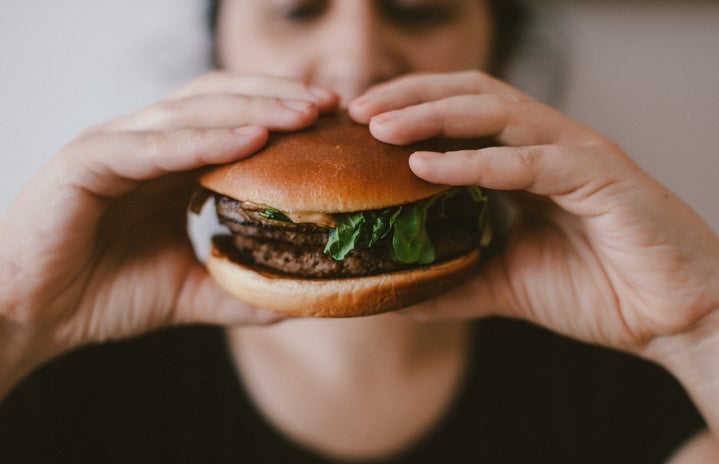We have probably all done it at some point in our lives! We have turned to food as a way of coping with the stress that life throws at us on a daily basis, for whether it may result from studying for an important exam, figuring out how to time manage work with school, or even preparing for a job interview. If you have experienced this, then you are not alone as I have had my fair share of experiences where I have turned to food in order to cope with my stress. This common phenomenon is called stress eating which often has several disadvantages with maybe a few benefits associated with it. Fortunately, there are plenty of healthier alternative coping mechanisms to choose from that may benefit you more. But what causes stress eating and why do we do it? Read on to learn more!
What Causes Stress eATING Anyway?
Stress eating is caused when our nervous system sends a message to our adrenal glands, which in turn causes the adrenal glands to release cortisol (a hormone that “increases appetite and may ramp up motivation…to eat”). Additionally the amount of cortisol levels can have an effect on your food preferences. For example, if you are experiencing a higher set of cortisol levels, then you may be more likely to consume foods that are “fat and sugar-filled” compared to foods that have a lower concentration in fat and sugar. This is likely due to the fact that foods with a high concentration of fat and sugar are shown to perhaps “counteract [an individual’s] stress.” Unfortunately stress eating often results in weight gain which can make it difficult to find the motivation to engage in healthier stress coping mechanisms.
In fact during the current pandemic, the APA Stress in America survey as of February, 2021 found that “42 % of U.S. adults reported undesired weight gain since the start of the pandemic” and that the average weight gain that has resulted from these unprecedented times was “29 pounds”. This increase was due to the many changes that have resulted from the pandemic including changes in dietary habits, lifestyle, activity, sleep habits, and so on.
In addition to increased weight gain amongst Americans due to COVID-19, the well known case of the freshman 15 is likely to have resulted from stress eating. This is likely because leaving your hometown for college and living on your own for the first time comes with a new set of challenges including being responsible for your own chores, when you choose to have your meals, when you get up for class, being on top of your finances, time managing all these new responsibilities with schoolwork and so on.
With these new set of challenges in place, you may find yourself succumbing to the temptations that college throws at you such as having the freedom to eat what you want, which can then lead to “piling on the portions” that the dining hall offers, and consuming foods with high fat and sugar content to help get through “late-night study sessions.” Although these temptations may seem ideal for many college students, these temptations have an unfortunate side effect in which you may experience weight gain from the calories that the food in the dining hall has. This particular phenomenon is especially common during the “first semester of freshman year” within the first half of college, in which college students can gain an average of “3 to 10 pounds”.
The freshman 15 can also be the result of the new found “anxiety, homesickness, or stress” many first year students experience during their first year of college. All these things can result in stress eating since many people often cope with these feelings through the use of sustenance and that often results in weight gain.
Why DO WE STRESS EAT?
Not only can a stressful event result in an increased appetite to consume foods that are high in fat, there are a multitude of other reasons that contribute to stress eating. For instance, some research studies have found that there is a gender difference “in stress-coping behavior” that is associated with stress eating. In regards to this, these studies found that women are more likely to turn to food as a source of comfort when stressed, while men are more likely to turn to alcohol or smoking when stressed.
Additionally any problems that are associated with work, school and other circumstances revolving around weight gain can also play an important role as to why someone stress eats. Working long hours while managing a load of schoolwork can not only add a lot of responsibilities to one’s plate, but can also add a greater amount of stress to one’s daily routine.
Also the amount of cortisol one may have can determine how likely one is to engage in stress eating. According to a study conducted by British researchers in 2007 regarding the likelihood of eating in response to stress showed that those with high cortisol levels were more likely to turn to eating as a stress coping mechanism than to those with low cortisol levels.
what are healthier stress coping mechanisms?
- Exercise
One of the best ways for dealing with stress is exercise since not only do you feel good afterwards, but exercise also gives you an excuse to be active or to be social if you choose to exercise with a group of friends. From jogging to yoga, there are a myriad of ways you can choose to exercise and that is why it is one of the best ways to cope with stress. Additionally, exercise has been shown to “lower cortisol levels [and] to get your mind off of intrusive thoughts.” Exercise has also been found to release endorphins throughout your body which can boost your confidence and your positivity. So find the form of exercise you are most interested in and have fun!
- Journaling
Another way of coping with stress is to simply write down your thoughts in a journal or through a document where you log your thoughts for each day, whichever you prefer. It has been shown that writing down your thoughts in a journal can have a “major effect on stress.” since you are letting out your emotions on paper and this alone can help you to reduce any stress that you may be having. Additionally, you can also write about other things other than your thoughts and emotions. For example, you can write about an important event that is coming up and what you are going to do to be successful at that event. In regards to stress eating, you can also use a journal to keep track of what you eat each day along with your calorie intake and doing this can help you eat healthier and to ensure that you are taking in a proportionate amount of calories. So if you want to take up writing and have a lot of stress in your life, then this is for you.
- Reading
If writing in a journal is not your cup of tea and reading the written word is more ideal, then look no further than getting lost in a good book. Reading can help you to become more relaxed since reading can help you to forget about what you are so stressed about and could even give you another perspective on life or a certain topic. I don’t read a whole lot, but when I do, I thoroughly enjoy it and something good usually comes out of it for me. I also find it amazing how getting lost in a good book can help you to develop more creativity in life since you are often imagining what the setting of the book looks like while you read and that alone can really benefit you in the process of de-stressing. If you are curious as to when you can de-stress with a good book, then I would recommend that you read right before bed or anytime you catch a break from schoolwork since reading at these times can help you to relax your thoughts.
- Meditating
One way to clear any thoughts, anxiety, or stress is the practice of meditation. If you are not familiar with meditation, meditation involves the practice of sitting in a “relaxed position and clearing your mind” of any thoughts that may be bringing you anxiety or stress. You can do this by “focusing your mind on one thought and clearing it of all others.” For example, you can focus on your breathing, counting, or on a sound such as “ooommm” and incorporate this into your meditation. Additionally meditation comes with many benefits including your “adrenal glands produce[ing] less cortisol,” your blood pressure returning to a normal level, your stress becoming minimized and your resilience increasing and many other health benefits that come with the practice. If this seems like the ideal way for you to de-stress, then it’s recommended that you give yourself at least “five to 20 distraction-free minutes” for meditating and taking it slowly in order to develop long-term habits with meditation.
- Make Time for Fun Activities Every Now and Then
When you are studying for a majority of your time, it is very easy to find yourself sticking to that routine on a daily basis and not participating in fun activities that come up. However, it is important to make time for any fun activities every now and then so you are not just studying. Also participating in fun activities can grant you the opportunity to spend some much needed time with your friends or family members. This can help to reduce any stress that you may currently have and can give you something to look forward to. I too often struggle with making time for fun events since I feel inclined to getting my schoolwork out of the way before I do anything fun. But when I finally find time to do fun activities, I wish that I could give myself more time to do these things since working on schoolwork can sometimes be stressful for me. Whether you choose to go to a sporting event, any live show, or any seasonal events that come up throughout the year (e.g. pumpkin picking, apple picking) you can find several ways to de-stress as needed.
Managing stress can be an incredibly daunting task since we all experience stress to a certain degree and some of us are more affected by stress than others. It is also easy to turn to food as a way to cope with stress because food has a way of making us feel better about ourselves. But it is important to have knowledge of any alternative stress coping mechanisms in order to make healthier choices if needed. If you find yourself indulging with food in order to de-stress and wish to engage in a healthier stress coping mechanism for a change, then I hope that you consider any of the coping mechanisms that I have provided and that you have learned something beneficial from reading about the causes and effects of stress eating.
XOXO Her Campus!









